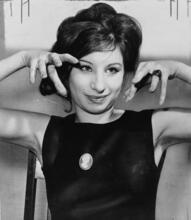Roseanne
Roseanne Barr at the Hard Rock Cafe in Maui in 2010.
Photo: Leah Mark
Roseanne Barr shattered stereotypes of femininity and motherhood with her raunchy, iconoclastic comedy. Already a mother of three, Roseanne began performing standup in Denver while working as a waitress, moving on to performing at the Los Angeles Comedy Store in 1980 and appearing on the, the Tonight Show in 1985. In 1988, she debuted the hit sitcom Roseanne, highlighting the lives of blue-collar workers and housewives. The show won Barr an Emmy and a Golden Globe in 1993; after the show ended in 1997, she created a talk show called The Roseanne Show in 1998 and a short-lived reality series, The Real Roseanne Show, in 2003. She returned to stand-up comedy in 2005, and in 2012, she ran for president as the Peace and Freedom Party’s nominee.
Overview and Early Life
Surely the most controversial American comedian since Lenny Bruce, Roseanne exists at the intersection of feminism and the working class. Although her comedy comes directly from the leftist feminism of the 1970s, Roseanne enjoyed her greatest success from an eponymous sitcom broadcast on ABC-TV beginning in 1988, when the working class had become otherwise invisible to popular culture. In its nine-year run, Roseanne garnered high ratings and the attention of media critics and political writers. Barbara Ehrenreich found in the program “the neglected underside of the eighties, bringing together its great themes of poverty, obesity, and defiance.” Though its star was never honored by the television establishment for her work, the success of the program launched this inelegant stand-up comedian to a highly visible platform for her own working-class feminism.
Born November 3, 1952, in Salt Lake City, the eldest child of Jerry and Helen Barr, Roseanne spent her early years aware that she belonged to a vocal minority. The Barr family, which included Roseanne’s siblings Geraldine and Benjamin, identified with Jewish culture to define itself against its neighbors in largely Mormon Salt Lake City. One window of exposure to Judaism came through Roseanne’s grandmother, Bobbe Mary, who forced herself to listen to antisemitic radio broadcasts, then phoned in her objections to the radio station. Jerry Barr inspired in his daughter an interest in comedy, and all three Barr children learned to heed his call of “comedian, comedian” when one appeared on television.
Comedy Influences and Beginnings
Comedy, Roseanne says in her autobiography, “was something that Jews really owned and knew about and did better than almost anyone else. It was the A type of non-halakhic literary activitiy of the Rabbis for interpreting non-legal material according to special principles of interpretation (hermeneutical rules).Midrash, it was about connection, and the symbolic murder of the status quo, and the blurring of what is sacred and what is profane ... a place on earth where Jews are not threatening to non-Jews and people in Utah.” With only comedians as positive role models, comedy became a lifeline for Roseanne (as it does, she suspects, for all Jewish people), and murdering the status quo a reason for living. This is an easy motif to detect in her comedy, and it is no surprise that among those she cites as inspirations are Fanny Brice, Dorothy Parker, Lenny Bruce, and Joan Rivers.
Married to Bill Pentland in 1974, Roseanne was raising three children in Denver on an unsteady income when she stumbled upon the Woman to Woman Bookstore and made a few inquiries about a working-class housewife’s role in the women’s movement. The first outlet for her comedy came at a restaurant in Denver where Roseanne served cocktails and rebuttals to men’s routine sexist comments. In both cases, she found a gift for using the politics of the women’s movement as comedy. From the restaurant to a local comedy club to L.A.’s Comedy Store and, in 1985, to The Tonight Show, Roseanne’s rise as a stand-up comedian was brisk enough to demonstrate that even in the most cynical quarter of the entertainment business, her message would be heard.
Roseanne and Mainstream Success
On Roseanne’s opening credits, a blaring saxophone plays as the camera follows the Conner family around the kitchen table. They are laughing and eating pizza, Chinese food, potato chips—nothing to suggest the carefully planned repasts of other TV mothers. The Conners move through the half-hour episode turning conventional images of maternity, marriage, wage-earning, and sexuality on their ears. The sitcom, a genre not generally recognized as one that challenges established social ideas, became for Roseanne a national forum for questioning the role of women. Unlike earlier sitcom moms, Roseanne Conner celebrated the vulgar. Whole installments of Roseanne were devoted to public flatulence, masturbation, and breast-feeding. Roseanne and her husband, Dan, lie to the IRS, default on bank loans, and, on an annual Halloween episode, dunk their neighbors in simulated blood while laughing from the sanctuary of the Conner kitchen.
Roseanne Conner was an incarnation of the comedian’s “domestic goddess,” her alter ego who Roseanne insists will someday be asked to rule the world. An early episode of Roseanne featured Roseanne Conner’s fantasy of taking a bath in her own tub alone, with no interruptions from her children or husband. During the course of the episode, Roseanne nonchalantly murders her family, is tried, and is ultimately exonerated because everyone realizes, amid a chorus of praise to motherhood, that the systematic denial of five minutes of privacy for Roseanne justifies her acts of carnage. The domestic goddess always wins in the end.
Public Opinion and Personal Life
Roseanne, who has abandoned her second names for their patriarchal assumptions, has never been far from public scrutiny. A four-year marriage to comedian Tom Arnold became the darling story of supermarket tabloids, as did her third marriage to former chauffeur Ben Thomas, with whom she had her fourth child in 1995. Roseanne’s performance of the national anthem on a televised baseball game, when she rubbed her crotch, attracted national attention. When New Yorker editor-in-chief Tina Brown named Roseanne as a guest editor of a special women’s issue, several writers associated with the magazine quit in noisy disgust. (The magazine once referred to Roseanne’s life as “one big unpopularity contest.”) In a 1996 interview, Roseanne reported, not for the first time, that her work as a comedian, a mother, and an activist has been a lengthy indenture to the one job for which she feels best qualified, queen of the United States. Her campaign slogan is a case in point for her subversive comedy: “Vote for Rosie and put some new blood in the White House—every 28 days.”
With the closing of the Roseanne show in 1997, the title character went on to two more programs named for her, as host of a short-lived talk show called The Roseanne Show (1998-2000), and as executive producer of the reality TV The Real Roseanne Show, which premiered on ABC in 2003. She also became increasingly involved with a newly “fashionable” brand of The esoteric and mystical teachings of JudaismKabbalah—which she credits for “help[ing] me to totally reconfigure my entire being”—and has joined the list of celebrity devotees of the controversial Kabbalah Centre in Los Angeles. Not enamored with traditional Judaism, she recites Kabbalistic meditations daily, saying that “to think about something bigger than yourself is so cool, to get out of your own ego and stuff.” The comedienne also credits Kabbalah study with improving her comedy, noting, “now I have the entire universe to make fun of. God gave us laughter; everything is funny.”
In 2006, Roseanne released a DVD for children called Rockin' with Roseanne: Calling All Kids!, and in 2007 she hosted a season of the reality TV show The Search for the Funniest Mom in America. Along with performing stand-up comedy across the country on multiple tours and festivals, she published her third book Roseannearchy: Dispatches from the Nut Farm in 2011. She also had her own reality TV show called Roseanne’s Nuts, which aired in 2011 for one season and followed her family’s life living on a macadamia nut farm in Hawaii.
Political Activities, Controversies, and Roseanne Reboot
In addition to her comedy, Roseanne also delved into the world of politics, announcing in 2011 that she would be running for President of the United States as well as Prime Minister of Israel. In 2012 she ran for the Green Party nomination for president but came in second to Jill Stein. She later won the nomination of the Peace and Freedom Party and ultimately won 0.05% of the popular vote, coming in sixth place overall.
Roseanne has found herself frequently in hot water over the years. In 2009, she was condemned for dressing as Hitler with a tray of burnt cookies, for a photoshoot in the Jewish magazine HEEB. At the time, she defended the photos as satire and as making fun of Hitler himself, but she later commented in the Forward that she had “dressed up to protest against Israel’s actions against Palestinians in Gaza.”
In 2018, a reboot of Roseanne, with Barr as executive producer and star, premiered to extremely high ratings and was renewed for a second season. However, after Roseanne posted a widely condemned racist tweet about Valerie Jarret, a senior advisor to President Barack Obama, the second season was cancelled. Instead, a spinoff of Roseanne without the titular character or Barr’s involvement premiered as The Conners in 2018.
SELECTED WORKS BY ROSEANNE
Roseanne: My Life as a Woman (1989).
My Lives (1994).
Andreeva, Nellie. “'Roseanne' Revival Premieres To Huge Ratings On ABC.” Deadline, March 28, 2018. https://deadline.com/2018/03/roseanne-huge-premiere-ratings-abc-1202354….
Andreeva, Nellie. “'Roseanne' Revival Renewed For Season 2 By ABC, Comedy Series' 11th Overall.” Deadline, March 31, 2018. https://deadline.com/2018/03/roseanne-revival-renewed-second-season-abc….
Andreeva, Nellie. “'Roseanne' Spinoff 'The Conners' Picked Up By ABC With No Roseanne Barr Involvement.” Deadline, June 22, 2018. https://deadline.com/2018/06/roseanne-spinoff-the-conners-abc-no-rosean….
Barker, Olivia. “Madonna has Faith on a String.” USA Today (May 25, 2004).
Berrin, Danielle. “Roseanne Plays Hitler for Heeb Magazine.” Jewish Journal, August 3, 2009. https://jewishjournal.com/uncategorized/71658/.
Carswell, Sue. “Roseanne for Queen of the Universe.” Out (February 1996): 62.
Cole, Lewis. “Roseanne.” The Nation (June 21, 1993): 878–880.
Dowd, Maureen. “Eustace Silly.” NYTimes, September 3, 1995, 4:11.
Dutka, Elaine. “Slightly to the Left of Normal.” Time (May 8, 1989): 82–83.
Ehrenreich, Barbara. “The Wretched of the Hearth.” The New Republic (April 2,1990): 28–31.
Friedman, Dan. “EXCLUSIVE INTERVIEW: Roseanne Barr Aims to Bring Justice to Women and Palestinians.” The Forward, September 12, 2011. https://forward.com/culture/142639/roseanne-barr-aims-to-bring-justice-….
Horowitz, Joy. “June Cleaver Without Pearls.” NYTimes, October 10, 1988, 1, 10.
Johnson, Ted. “Roseanne Barr Apologizes for Obama Aide 'Joke,' Says She's 'Leaving' Twitter.” Variety, May 29, 2018. https://variety.com/2018/politics/news/roseanne-valerie-jarrett-1202823….
Lahr, John. “Dealing with Roseanne.” New Yorker (July 17, 1995): 42–61.
Levy, Mike. “Roseanne Pitches Kabbalah Center.” Jewish Journal of GreaterL.A. (March 30, 2001).
Nathan-Kazis, Josh. “Remember When Roseanne Dressed As Hitler For Heeb?” The Forward, March 29, 2018. https://forward.com/fast-forward/397835/remember-when-roseanne-dressed-…
Sessums, Kevin. “Really Roseanne.” Vanity Fair (February 1994): 58+.
Wolcott, James. “Roseanne Hits Home.” New Yorker (October 26, 1992): 123–124, and “With Respect to Roseanne.” New Yorker (March 4, 1996), 134–135.











